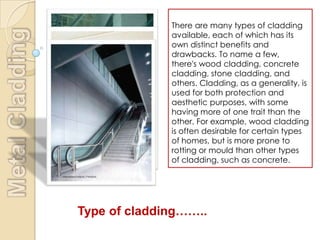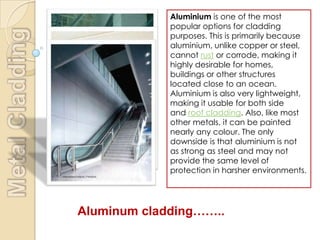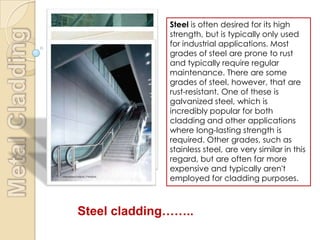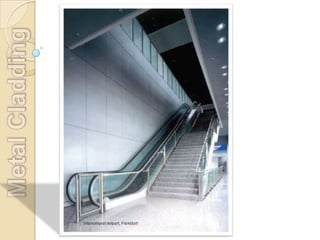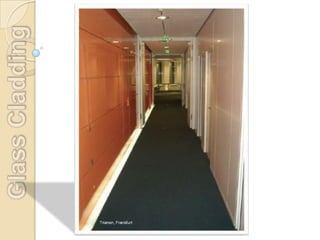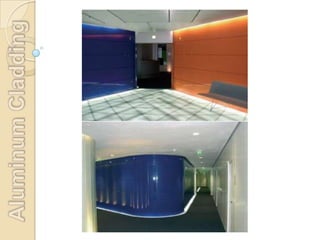Wall cladding
- 1. Since 1943 Metal Cladding has been providing advanced coating applications to a wide variety of industries such as aerospace, medical, industrial, military, food processing, automotive, electronics, plastics, composites, HVAC coil coating, compression moulding, heat transfer, sublimation & decorative. Some history……..
- 2. There are many types of cladding available, each of which has its own distinct benefits and drawbacks. To name a few, there's wood cladding, concrete cladding, stone cladding, and others. Cladding, as a generality, is used for both protection and aesthetic purposes, with some having more of one trait than the other. For example, wood cladding is often desirable for certain types of homes, but is more prone to rotting or mould than other types of cladding, such as concrete. Type of cladding……..
- 3. Metal cladding is a type of exterior cladding made of metal. While composed of a different material, it performs the same function that nearly all other types of cladding do, which is to protect the exterior or interior of a building. Outside of structural protection, cladding can also be used to improve the look of a building. Metal cladding can be very useful for both purposes, as metal in general is typically very strong and durable, and its wide variety of types and finishes provide for aesthetic versatility. Unlike most other types of cladding, however, metal cladding can also be used for roofing. Use of cladding……..
- 4. Aluminium is one of the most popular options for cladding purposes. This is primarily because aluminium, unlike copper or steel, cannot rust or corrode, making it highly desirable for homes, buildings or other structures located close to an ocean. Aluminium is also very lightweight, making it usable for both side and roof cladding. Also, like most other metals, it can be painted nearly any colour. The only downside is that aluminium is not as strong as steel and may not provide the same level of protection in harsher environments. Aluminum cladding……..
- 5. Steel is often desired for its high strength, but is typically only used for industrial applications. Most grades of steel are prone to rust and typically require regular maintenance. There are some grades of steel, however, that are rust-resistant. One of these is galvanized steel, which is incredibly popular for both cladding and other applications where long-lasting strength is required. Other grades, such as stainless steel, are very similar in this regard, but are often far more expensive and typically aren't employed for cladding purposes. Steel cladding……..
- 6. Copper is another type of metal cladding which is usually used only for roofs or other finishing work. While it may provide adequate protection, it is often chosen for its aesthetic appeal alone. Copper starts out as a bright, shiny orange, but eventually corrodes into a light green. This colour is highly desirable for many buildings and is often chosen solely for that purpose. From a functional standpoint, however, copper and other metals are chosen for sloped roofing applications because they allow for snow to slide off easily, unlike tile or shingles. Copper cladding……..


